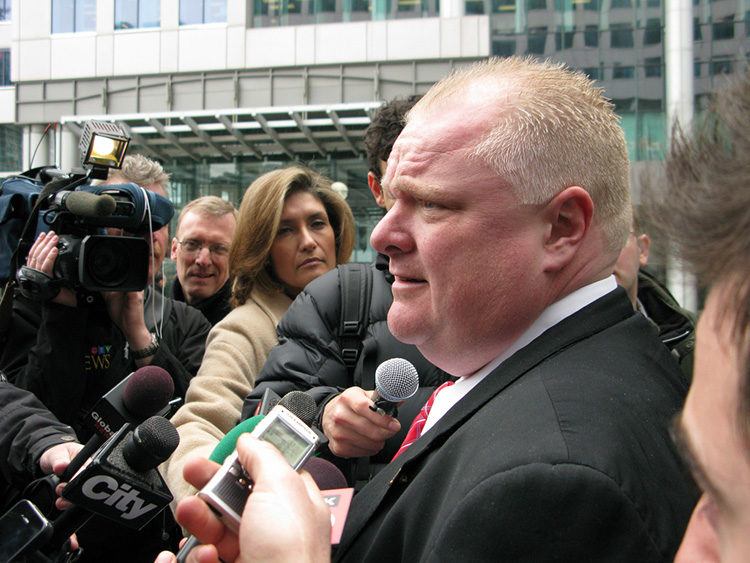
Rob Ford is back in the news–this time, of his own choosing.
In a special to the National Post published on December 3, 2015, Ford wrote an op-ed to mark the one-year anniversary of John Tory’s mayoral term. “Congratulations, John, you’re sitting in the big chair and you’ve finally shaped up to be a typical politician,” wrote the former mayor and sitting Toronto city councillor.
Naturally, there’s a heated discussion happening on social media about the decision by the Post to run a piece penned by Ford, many sarcastically dubbing him as “Postmedia’s newest columnist.”
The underlying issue at the heart of such comments is the concern that arises when politics and journalism intersect. Giving a politician space to write his own thoughts on a medium that is supposed to be critical of him, a watchdog over how he serves the public, seems contradictory.
Ryerson Review of Journalism spoke to Matt Gurney, acting editor of the Post‘s Full Comment section, to learn about the editorial decision to run Ford’s op-ed. Rob Ford’s chief of staff contacted Gurney directly and expressed Ford’s interest in making a submission to the Post. Gurney directed him to the official email for op-ed pitches.
After reviewing the piece carefully, Gurney decided to run it. “Rob Ford remains an elected official in the City of Toronto, and in general, I do try to give our elected officials every opportunity to speak to the people through my pages,” said Gurney in an email to the RRJ. Gurney considered the fact that Ford was “a noteworthy figure, beyond the mere fact of his elected office” and that people would be interested in what he said.
Given that, and his stated intention to run against Mr. Tory in 2018 (health permitting), I thought it would be interesting to print the piece. I have also offered Mayor Tory the option of replying with an op-ed article of his own. I hope he does.
There is no rule in journalism that news can’t be critical of the former mayor and not run his voice at the same time. The concept of “opportunity to reply” exists to allow for fair, balanced and thorough coverage of an an issue or event. “So long as it’s not presented as news, which this piece wasn’t, there is, I think it’s fine,” said Gurney. Naheed Nenshi, mayor of Calgary, for instance, recently published an op-ed in The Globe and Mail to respond to the refugee debate in Canadian politics.
The issue arises when a conservative-leaning newspaper like the Post gives the space to a conservative politician like Ford to make an explicit comparison of his mayoral successes with the current mayor’s progress. Gurney stating that he factored in Ford’s “stated intention to run” implies this, as does the fact that Ford’s op-ed read more like a political speech than any substantive opinionated analysis of an issue or topic.
The fact that the persona of Rob Ford was going to get the Post traction is the problem, which Gurney too recognizes:
I grant that Rob Ford’s personal … characteristics … did appeal to me,” said Gurney, “he generates controversy. I like controversy. But setting that aside, I tend to think I would generally always side on publishing a piece of this nature. Indeed, if it was anyone but Rob Ford, I doubt you’d be interviewing me about the decision to publish.
He’s (mostly) right. Personalities like Rob Ford make the news no matter what they do, and the question is why we let them. Perhaps it is because we have a responsibility to allow these voices–all voices–to exist in the public sphere, unfiltered. The motives to do so, whether they be clicks, traction, politics or curiosity should, however, be kept in check.
Mayor Tory, the ball is in the public sphere for you to take should you want to.
About the author
Fatima Syed is the blog editor of the spring 2016 issue of the Ryerson Review of Journalism.
